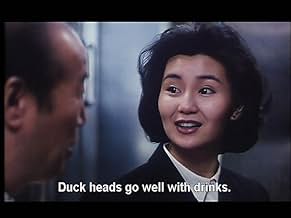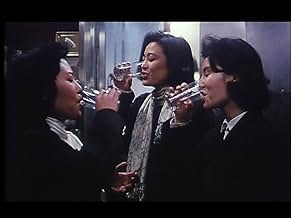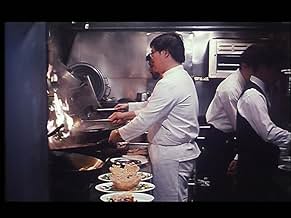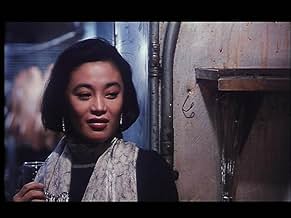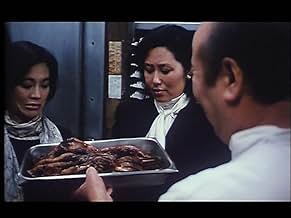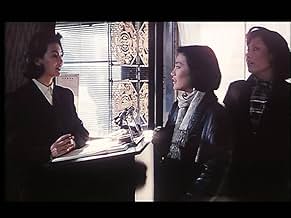IMDb-BEWERTUNG
6,7/10
437
IHRE BEWERTUNG
Füge eine Handlung in deiner Sprache hinzuThree very different Asian women forge a friendship in New York.Three very different Asian women forge a friendship in New York.Three very different Asian women forge a friendship in New York.
- Regie
- Drehbuch
- Hauptbesetzung
- Auszeichnungen
- 8 Gewinne & 3 Nominierungen insgesamt
Siqin Gaowa
- Zhaohong
- (as Gaowa Siqin)
Luke Valerio
- David
- (as Luciano Valerio)
Vincent J. Mazella
- Bartender
- (Nicht genannt)
Charlie Sara
- John
- (Nicht genannt)
Empfohlene Bewertungen
How can Maggie Cheung look so beautiful and effortlessly elegant? Should be outlawed.
I didn't think I had seen Sylvia Chang this young, but it turns out I had seen her in several 80s movies, only I hadn't noticed her I guess.
This movie has a lot of unrealized potential. Or rather it didn't live up to its potential. There are a lot of interesting plotlines and scenes scattered here and there but they don't come together at all. There's a lot that just doesn't work. It feels artificial, superficial and theatrical. It feels fake. Off. I'm sure there's a fair amount of dubbing in this with the English speaking that doesn't sound quite right. Even native English speaking characters sound and look off. Maybe the cheap production took a toll on the quality. I cannot fault the three main leads for their acting but the rest... There are maybe three solid scenes between the three ladies and like I said there are quite a few good and deserving plotlines that are just thrown in there and abandoned. Like what did Wang's father do to that poor woman? What's the deal with Lee's sexuality and that woman following her around? I almost wish they stuck to that cause it would make her character more conflicted and more interesting. And poor Zhao Hong's marital troubles and that tone-deaf husband of hers. Her mother's suffering. I feel the writers wanted to throw a lot in the script, but thought they also need to make it a little lighthearted and modern. It's difficult to have it both ways and pull it off. Not the case here sadly. New York actually looks decent, unlike in Farewell China and An Autumn's Tale, so I really appreciated that. And can we please have some decent looking men for these beauties please? It's ridiculous for them to be paired with these guys.
Bumped it up a little for the few good ideas that it throws in there and the three leading ladies.
I didn't think I had seen Sylvia Chang this young, but it turns out I had seen her in several 80s movies, only I hadn't noticed her I guess.
This movie has a lot of unrealized potential. Or rather it didn't live up to its potential. There are a lot of interesting plotlines and scenes scattered here and there but they don't come together at all. There's a lot that just doesn't work. It feels artificial, superficial and theatrical. It feels fake. Off. I'm sure there's a fair amount of dubbing in this with the English speaking that doesn't sound quite right. Even native English speaking characters sound and look off. Maybe the cheap production took a toll on the quality. I cannot fault the three main leads for their acting but the rest... There are maybe three solid scenes between the three ladies and like I said there are quite a few good and deserving plotlines that are just thrown in there and abandoned. Like what did Wang's father do to that poor woman? What's the deal with Lee's sexuality and that woman following her around? I almost wish they stuck to that cause it would make her character more conflicted and more interesting. And poor Zhao Hong's marital troubles and that tone-deaf husband of hers. Her mother's suffering. I feel the writers wanted to throw a lot in the script, but thought they also need to make it a little lighthearted and modern. It's difficult to have it both ways and pull it off. Not the case here sadly. New York actually looks decent, unlike in Farewell China and An Autumn's Tale, so I really appreciated that. And can we please have some decent looking men for these beauties please? It's ridiculous for them to be paired with these guys.
Bumped it up a little for the few good ideas that it throws in there and the three leading ladies.
A year after making his brilliant Cantonese supernatural romance Rouge, Stanley Kwan came to Manhattan to film Full Moon in New York, which gives us a slice of life type story of three women who are different in many ways, but share a common heritage. I believe the intention was to show the diversity within the Chinese community, some of the struggles of its members in America, and the strength in friendship and unity. It's not a bad concept, and with Maggie Cheung, Sylvia Chang, and Gaowa Siqin you could certainly do worse, but each of the subplots isn't developed or resolved in ways that made this film particularly satisfying. Kwan himself said the film "turned out to be an embarrassment," but that's probably too harsh, as there are several wonderful little moments to be found here.
One woman (Chang) is an actress from Taiwan dating a broke white guy and soon to break up with him; another (Cheung) is from Hong Kong and works in her father's restaurant, she's bisexual and just ending a lesbian relationship; the third (Siqin) is a new bride from mainland China who has just married an "Americanized" Chinese man. In a parallel to these very different lives, one mentions about the restaurant, "It's a Hunan place run by Cantonese serving Peking duck," or words to that effect. The three women form a friendship despite some disagreements initially when Siqin's character says simply, "We're all Chinese, why argue?" and that seems to be the spirit of the film.
Each woman is buoyant and strong, but we see bits of their difficulties. Cheung's character is harassed on the street and she responds by chasing the guy down and whacking him with her shoe. Chang's character goes to an audition where a white director has the nerve to ask her why she as a Chinese woman thinks she can play Macbeth (grrr, and her response is brilliant). Siqin's character wants to bring her suffering mother over to live with them, which is perfectly natural in the traditional culture, but the idea is met with disdain from her husband.
The film is not helped by its subpar audio, which has tinny vocals and strange attenuation. It's also not helped by how the stories aren't fully developed, or complete their arcs. Cheung's character's lesbian past is limited to moments being essentially stalked, and an indication she wants to date a man now, but there is no real introspection. After Siqin's character walks out on her husband, we get no further scene of conflict or resolution. Lastly, Chang's character has a father who from the KMT, and is helping a woman who suffered during the Cultural Revolution to write a book. In one of the stronger visual moments of the film, her gaze and brief words inform us that he's actually abused her himself, in order to give her injuries he can then attribute to the Communist government. The idea of that felt ridiculous and wrong to me, and on top of that it was expressed in far too brief a manner, then simply left dangling.
The film has its heart in the right place and it's possible you like it better, but unfortunately for me it comes up a little short.
One woman (Chang) is an actress from Taiwan dating a broke white guy and soon to break up with him; another (Cheung) is from Hong Kong and works in her father's restaurant, she's bisexual and just ending a lesbian relationship; the third (Siqin) is a new bride from mainland China who has just married an "Americanized" Chinese man. In a parallel to these very different lives, one mentions about the restaurant, "It's a Hunan place run by Cantonese serving Peking duck," or words to that effect. The three women form a friendship despite some disagreements initially when Siqin's character says simply, "We're all Chinese, why argue?" and that seems to be the spirit of the film.
Each woman is buoyant and strong, but we see bits of their difficulties. Cheung's character is harassed on the street and she responds by chasing the guy down and whacking him with her shoe. Chang's character goes to an audition where a white director has the nerve to ask her why she as a Chinese woman thinks she can play Macbeth (grrr, and her response is brilliant). Siqin's character wants to bring her suffering mother over to live with them, which is perfectly natural in the traditional culture, but the idea is met with disdain from her husband.
The film is not helped by its subpar audio, which has tinny vocals and strange attenuation. It's also not helped by how the stories aren't fully developed, or complete their arcs. Cheung's character's lesbian past is limited to moments being essentially stalked, and an indication she wants to date a man now, but there is no real introspection. After Siqin's character walks out on her husband, we get no further scene of conflict or resolution. Lastly, Chang's character has a father who from the KMT, and is helping a woman who suffered during the Cultural Revolution to write a book. In one of the stronger visual moments of the film, her gaze and brief words inform us that he's actually abused her himself, in order to give her injuries he can then attribute to the Communist government. The idea of that felt ridiculous and wrong to me, and on top of that it was expressed in far too brief a manner, then simply left dangling.
The film has its heart in the right place and it's possible you like it better, but unfortunately for me it comes up a little short.
Stanley Kwan's film, "Full Moon in New York," is a great film about Chinese immigration to America. It looks at three women, from Taiwan (Sylvia Chang), mainland China (Gaowa Siqin), and Hong Kong (Maggie Cheung), respectively, and how they overcome socio-cultural differences to forge a friendship based on mutual suffering and understanding in surviving life in "the Big Apple." While issues involving Chinese labor, Chinatowns, stereotypes of Asian American actors, and politics are touched on, they are not explored in depth. Still, Kwan provides an interesting character study of three women's struggle to make a name for themselves and find happiness and love in a society where racial prejudice and stereotypes, as well as cultural differences isolate them. Yet they find solace in each other's experiences and become friends despite old territorial grievances and lack of a common language.
Sylvia Chang, Maggie Cheung, and Siqin Gaowa were originally from China. Now they live in New York City. They speak Chinese to each other, and sometimes sing Chinese songs. Their lovers and husbands are Chinese. But they feel themselves losing their identities in Manhattan.
The melting pot that is part of the mythology of the United States is a great promise and a great threat. I grew up with relatives who fled Europe to get here. I feel I understand what makes this nation so good in a way that some one who grew up never knowing anything different, or caring about someone who could tell them about it can. It's a commonplace for many, and so not valued. For people like me, the promise of America is its indifference. When it works well, no one cares if I go to a synagogue instead of a church, or don't go at all, whether I speak English or Yiddish or Gullah at home.
But that indifference is also corrosive. If no one cares, then why should you? And that is the strain that these three women come to recognize and seek each other out for. It's how communities are formed. But for how long?
The melting pot that is part of the mythology of the United States is a great promise and a great threat. I grew up with relatives who fled Europe to get here. I feel I understand what makes this nation so good in a way that some one who grew up never knowing anything different, or caring about someone who could tell them about it can. It's a commonplace for many, and so not valued. For people like me, the promise of America is its indifference. When it works well, no one cares if I go to a synagogue instead of a church, or don't go at all, whether I speak English or Yiddish or Gullah at home.
But that indifference is also corrosive. If no one cares, then why should you? And that is the strain that these three women come to recognize and seek each other out for. It's how communities are formed. But for how long?
Three women from three asain countries(considering hong kong seperate) meet in New york of all the places in the world and form a uncanny friendship considering they belong from different regions and share different professions.
One is a aspiring actress trying her hand in different acting auditions, One is a daughter of a chinese restaurant owner, herself working there; and one is a newly married trying her luck in love.
It may not be a "Eat Sleep Man Woman" by ang lee, or "Taipei Story" by edward yang but Stanley Kwan's this film sure does leave a mark.
The lives of the three leads could have been explored more but still how much is shown does a good job for us in understanding their situations and problems.
This is a type of movie that you may forget about after some time, but still remember in a vague memory that you had seen it. It manages to keep you entertained in its less than 90 min runtime, which is enough for it. Seeing it after knowing the leading ladies and their other works, especially Maggie cheung and Sylvia Chang will surely help you like the film better.
One is a aspiring actress trying her hand in different acting auditions, One is a daughter of a chinese restaurant owner, herself working there; and one is a newly married trying her luck in love.
It may not be a "Eat Sleep Man Woman" by ang lee, or "Taipei Story" by edward yang but Stanley Kwan's this film sure does leave a mark.
The lives of the three leads could have been explored more but still how much is shown does a good job for us in understanding their situations and problems.
This is a type of movie that you may forget about after some time, but still remember in a vague memory that you had seen it. It manages to keep you entertained in its less than 90 min runtime, which is enough for it. Seeing it after knowing the leading ladies and their other works, especially Maggie cheung and Sylvia Chang will surely help you like the film better.
Wusstest du schon
- VerbindungenFeatured in Nian ni ru xi (1997)
Top-Auswahl
Melde dich zum Bewerten an und greife auf die Watchlist für personalisierte Empfehlungen zu.
Details
Zu dieser Seite beitragen
Bearbeitung vorschlagen oder fehlenden Inhalt hinzufügen


